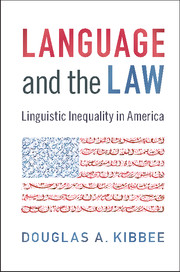Book contents
- Frontmatter
- Contents
- Preface
- Acknowledgments
- 1 Equality, Liberty, and Fairness in America
- 2 Language and Democracy
- 3 Linguistic Inequality in the Legal System
- 4 Language and Education
- 5 Government, Public Services, and the English-Only Movement
- 6 Language in the Workplace
- 7 Conclusions
- Bibliography
- Index of Court Cases
- Index of Names
- General Index
7 - Conclusions
Published online by Cambridge University Press: 05 August 2016
- Frontmatter
- Contents
- Preface
- Acknowledgments
- 1 Equality, Liberty, and Fairness in America
- 2 Language and Democracy
- 3 Linguistic Inequality in the Legal System
- 4 Language and Education
- 5 Government, Public Services, and the English-Only Movement
- 6 Language in the Workplace
- 7 Conclusions
- Bibliography
- Index of Court Cases
- Index of Names
- General Index
Summary
In his first inaugural address (1801), Thomas Jefferson enunciated what to him was a “sacred principle” of republican government, “that tho’ the will of the majority is in all cases to prevail, that will, to be rightful, must be reasonable; that the minority possess, their equal rights, which equal laws must protect, and to violate would be oppression.” In the same address, Jefferson speaks of “our equal right to the use of our own faculties, to the acquisitions of our own industry, to honor and confidence from our fellow citizens, resulting not from our birth, but from our actions and their sense of them.” He foresees many of the issues we have dealt with in the preceding pages, the relationship between the majority and minorities, the veneration of equality, for all (as liberty to pursue our individual happiness), for minorities (as rights that protect the minority), and procedurally (through a respect for laws). This equality does not deny material difference, as acquisitions earned through effort are natural, as are the differences in our innate faculties.
From the earliest days of the Republic, equality and liberty have been supreme virtues in American ideology, necessary components of a legitimate democracy. Both are served by justice, a process of rational decision-making. Equality has natural constraints: we are all born unequal in one manner or another. Justice is a matter of deciding rationally the ways in which we should be equal, and by what procedures we should pursue the redistributions necessary to create equality in those domains. Liberty also has natural constraints: our freedom does not extend to committing crimes. Justice is a matter of deciding rationally the limits of our liberty. The rationality of justice depends on a sense of fairness, a confidence in an impartiality born of higher principles. Reason, in a social context, is a perception rather than a reality, a term whose meaning is constantly negotiated. So too are the meanings of equality, liberty, and justice.
The negotiation of meaning takes place in language. There is no level playing field of language, as we judge others by their language and through our language. Language is a fundamental inequality of any society.
- Type
- Chapter
- Information
- Language and the LawLinguistic Inequality in America, pp. 182 - 199Publisher: Cambridge University PressPrint publication year: 2016

